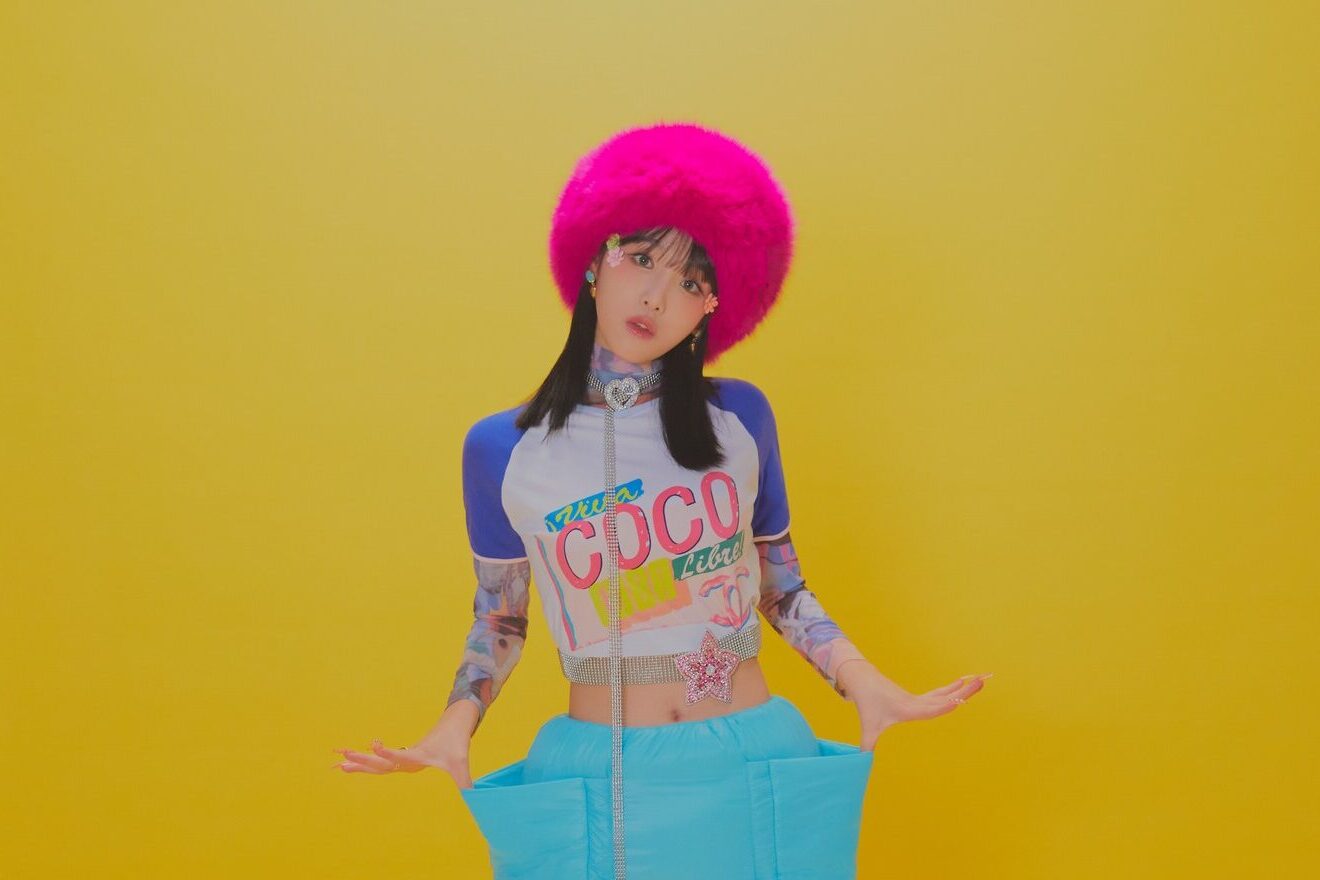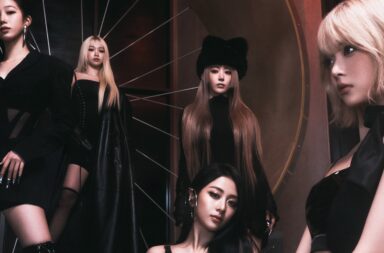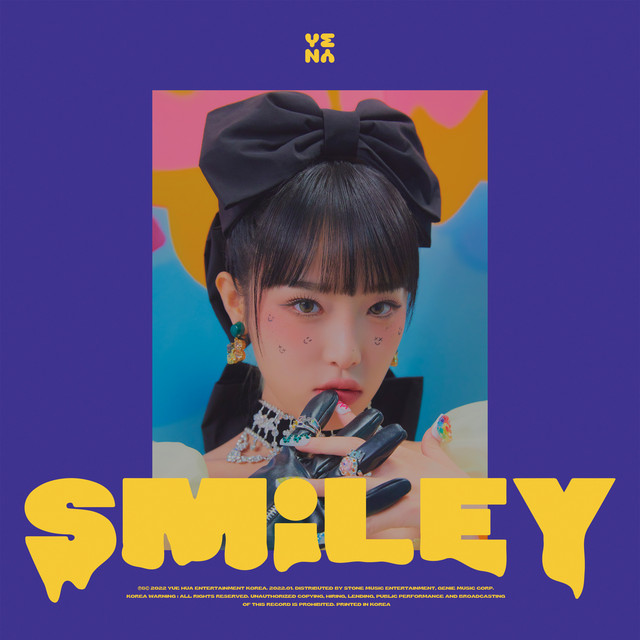
Following releases from ex-members Kwon Eunbi, Jo Yuri, and Kang Hyewon, Choi Yena is now the latest from the disbanded Iz One to make her debut as a soloist, under Yuehua Entertainment. Her EP Smiley (stylised as (“ˣ‿ˣ (SMiLEY)”) accompanies a title track of the same name, and together they stamp out a very clear concept of playfulness and optimism for the 22-year-old.
Yuehua cleverly leans into Yena’s established image as a cheerful, outgoing girl-next-door by converting it into pop music with an impressive amount of self-awareness and attention to detail. Her producers deliver consistently polished tracks, riding on the recent pop-rock resurgence, while also smoothly folding in spoonfuls of R&B and disco.
Importantly, they do so without ever trying to cover too much ground sonically or conceptually, doubling down on their chosen subject and refining the details of it instead. This intentional simplicity and polished execution means that this debut is one of the more sleek, enjoyable, and focused pop efforts from the entire Iz One cohort so far. It has more than its fair share of catchy melodies, delivered with earnestness by Yena.
As the follow-up to Yuehua’s only other Korean female act, Everglow, as well their only other Korean soloist, Woodz, Yena’s debut was worth anticipating, if only because of the consistent production quality that both artists have brought us over the past few years. Smiley reiterates elements from each, with spotless production and mixing à la Woodz, and an impressive selection of earworm melodies à la Everglow.
Notably, in the years that they’ve been active in the K-pop industry, Yuehua appear to have developed a taste for quality over quantity, opting consistently for short and sweet EPs instead of full-length albums. These are all the more enjoyable for their short length, thanks to little to no filler content. Smiley is no exception, presenting five tracks in 16 minutes that are all enjoyable and generally memorable.
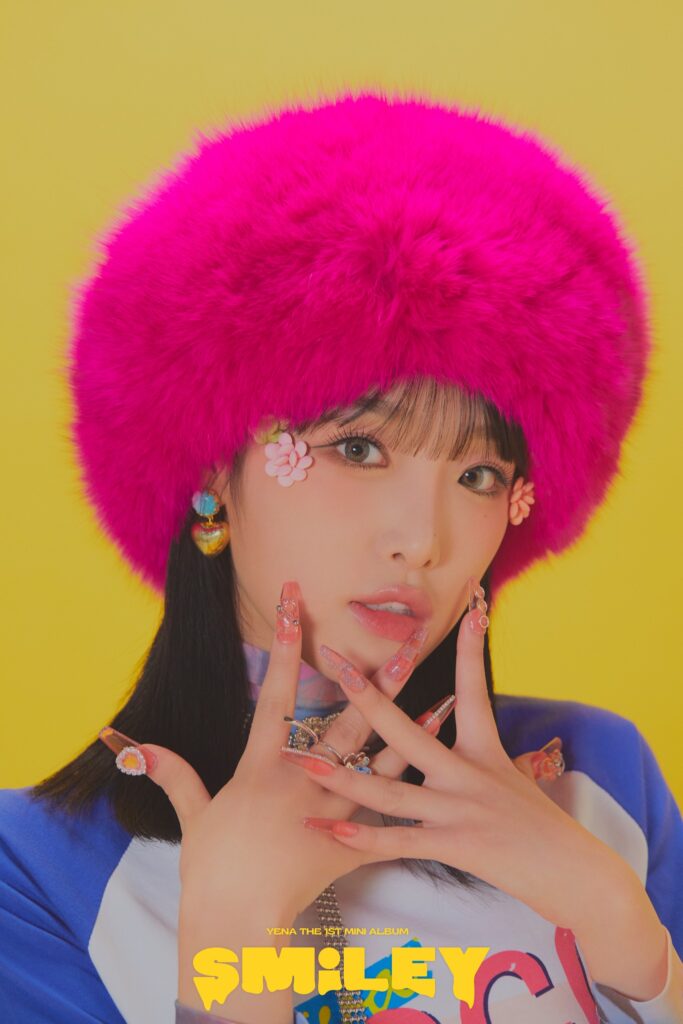
Yuehua have also demonstrated a preference for working with the same producers and songwriters (selected for their track record and trending popularity), resulting in both an impressive roster of collaborators and satisfyingly consistent sounds for their artists. Smiley sees Yena sing over tracks by Everglow collaborators and experienced girl-group songwriters, Ollipop and 72, as well as Mayu Wakisaka. Yena herself also contributes to the lyrics on this EP, adding a personal touch to lyrics that are otherwise a touch bland.
The project eschews the typical K-pop album structure by opening with the soft R&B ballad, “Before Anyone Else”. The decision works out well, easing listeners in with Yena’s characteristically sweet and husky vocals floating on a cloud of synth plucks and dreamy acoustic guitars. In particular, its position relative to the uptempo last track, “Vacay”, vastly improves the EP’s repeat value – the breath of rest that listeners need to not feel overwhelmed comes at the beginning of another cycle, rather than at the end where it would be natural to stop afterwards.
“Smiley” follows as the title track, as a musical and literal call to wake up and seize the day. Referencing the current noughties pop-rock revival spearheaded by artists like Olivia Rodrigo, “Smiley” is an unapologetically upbeat and joyful pop-rock number with a catchy chorus that recalls both Disney belters and feel-good J-pop and J-rock from the 2000s. (It also feels like a follow-up to Woodz’ “Bump Bump”). Calling on listeners to smile away their blues, it summarises Yena’s current aim as an artist and her greatest strength as a person – to bring laughter and positivity to the world:
And I say “hey”
I’m gonna make it smile, smile, smile away
I’ll make a beautiful smile and let it go
Just smile away, just smile away-ay
To forget about pain, sadness and loneliness
I say “hey”
I never wanna cry, cry, cry all day
When tears suddenly fill up
Just smile away, just smile away-ay
I’ll say goodbye with my smiley face
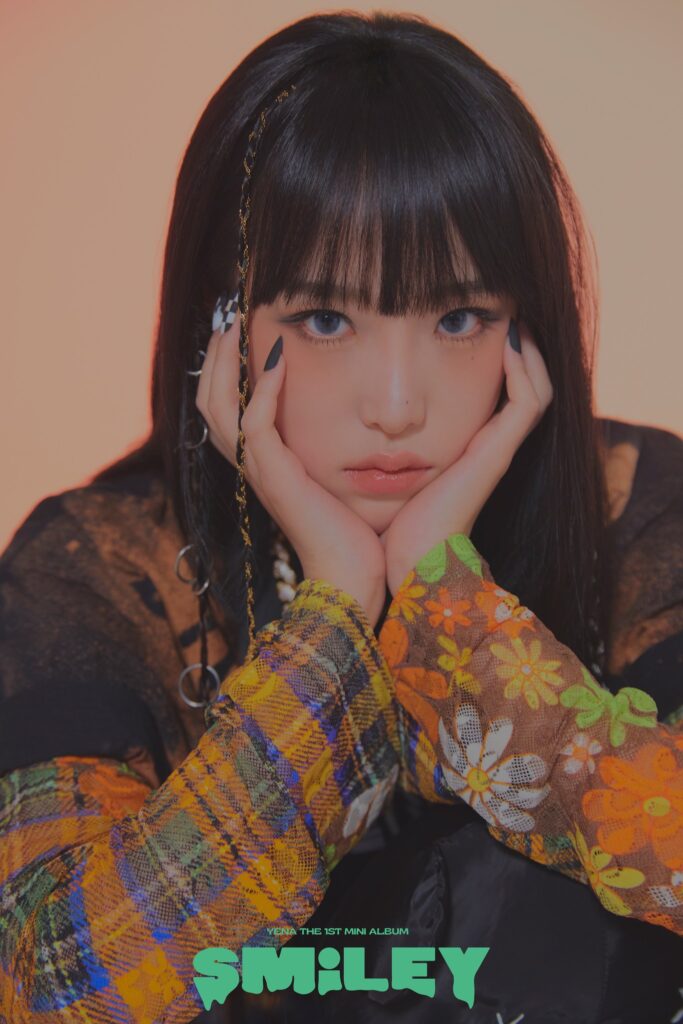
Yuehua’s decision to feature Bibi cleverly utilises both her versatility as a singer-rapper and her trending popularity – this is just one of her many recent features and collaborations, which include promotion by 88rising. It brings additional attention and credibility to “Smiley”, while also providing a very interesting contrast in terms of vocals and personality. On the second verse, Bibi plays a darker character who rebels against Yena’s optimism with a determined pessimism:
Excеpt when I sneer, the corners of my lips are chillin’
You have to be bad to survive, what are you doing?
If you’re cute and pretty, are you the best, but
It feels good to see you
My crooked personality everybody’s afraid of me
Really, why do you keep smiling?
Take the opportunity to disarm me
Can we be friends just the two of us?
Her conflicting message can be interpreted as both an external or internal voice of opposition relative to Yena’s. Either way, it clarifies that it’s not that Yena is actually happy all the time, or trying to promote forced positivity – she accepts her bad times and negative feelings, but chooses continually to get back up again. Along with Bibi’s contrasting nasal tone and drawling delivery, this feature adds a vital duality to the song’s otherwise uber-positive message and peppy, saccharine sound. It’s this self-awareness that saves “Smiley” from crossing the line into cheesiness or cloying sweetness, and which permits you to enjoy it for what it is.
Echoing its rock influences, “Lxxk 2 U” is the sibling to “Smiley” (both were produced by Ollipop). As fun as “Smiley” is, “Lxxk 2 U” wins out because of the sheer pop-punk nostalgia that radiates from its pores. The two songs are consistent without being overly similar – “Smiley” is overwhelmingly joyful, while “Lxxk 2 U” balances an upbeat tempo with edgier elements and a darker, angrier message:
Boy, go away, luck to you, luck to you
May you be more miserable, oh-ooh-woah
In the time when you left me
I pray intently for you to be in pain
Luck to you
Luck to you
Wish you’re not happy
Wish all luck to you
The song pays tribute to artists like Avril Lavigne, with gritty, distorted guitars and arrangement choices such as the guitar-only penultimate chorus that clearly reference classic pop-punk techniques (the outro in particular recalls Paramore songs like “Ignorance”). It fleshes out a breakup story with a sense of bittersweetness and urgency on the verses, tension on the prechoruses, catharsis on the choruses, and rebellion on the bridge. The attention to detail with which it explores every avenue of musical storytelling and recreates every nostalgic element of pop-punk highlights “Lxxk 2 U” as one of the most enjoyable songs from the album.
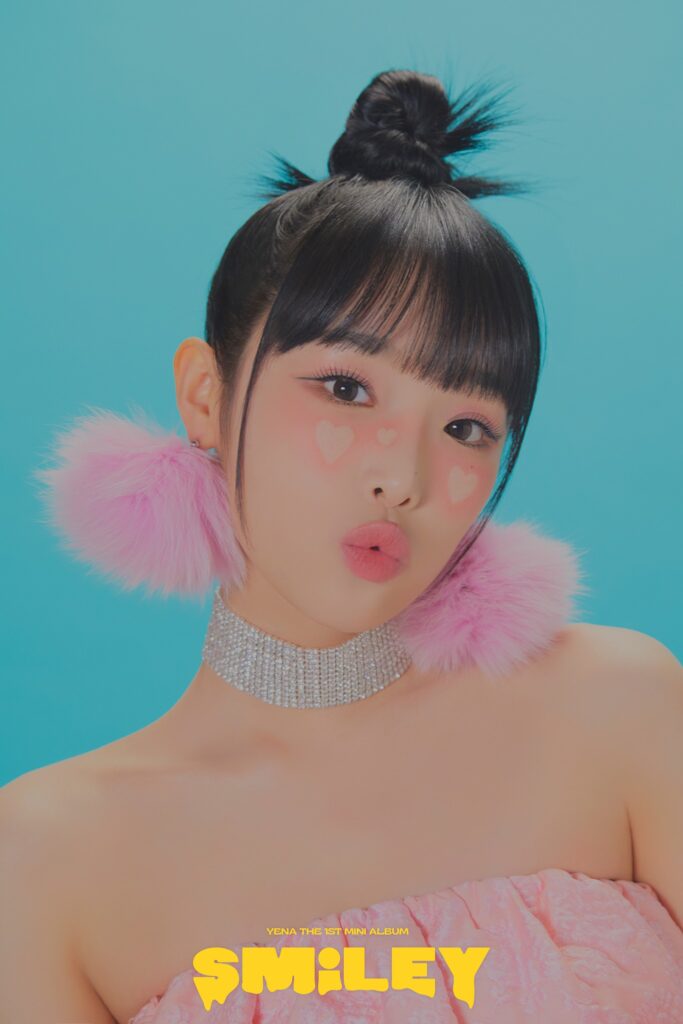
Meanwhile, “Pretty Boys” returns to more of a dance-pop sound, with 80s-inspired synths and drums and an immediately catchy and familiar vocal hook. The melodic composition on this song in particular is almost Eurodance-like. While the melodies are almost too familiar (the hook especially feels like it exists solely for catchiness), there is little to fault with the songwriting. The track progresses with flourish, with Yena’s coy exclamations of “boys, boys, boys” instantly opening up the sonic space of the verses into a euphoric and fully extended stadium chorus. It also gives Yena a chance to tap into her more mature side, with a flirtatiousness that is still playful and girlish.
The EP ends with “Vacay”, another upbeat pop number that uses disco beats and guitars to create a typical summer holiday soundtrack that tells listeners to relax and take a vacation. Unfortunately, the structure, style, and message copy the format first established by Katy Perry a little too closely to offer anything new, especially considering that it has already been recycled numerous times in songs such as Girls Generation’s “Party”. Its melodies are the least catchy on the project, and so it becomes the weakest and most forgettable addition overall.
Still, it’s an inoffensive way to finish an otherwise fun and succinct EP; indeed, Smiley ends at exactly the point where listeners would tire of any more bright and poppy tracks. The album neatly summarises Yena’s intent and opening statement as a solo artist, with a dazzlingly bright and cheerful image that sets her apart clearly from her former groupmates.
Refined pop melodies are packaged into watertight arrangements that are on-trend without being defined by them, resulting in more than a few highlights – “Smiley”, “Lxxk 2 U”, and “Pretty Boys” all jostle to be named the project’s best song. On the other hand, “Vacay” is the album’s clear weakness, but even so it contributes to Smiley’s overall concept of polished, fun songs that make people smile and feel good.
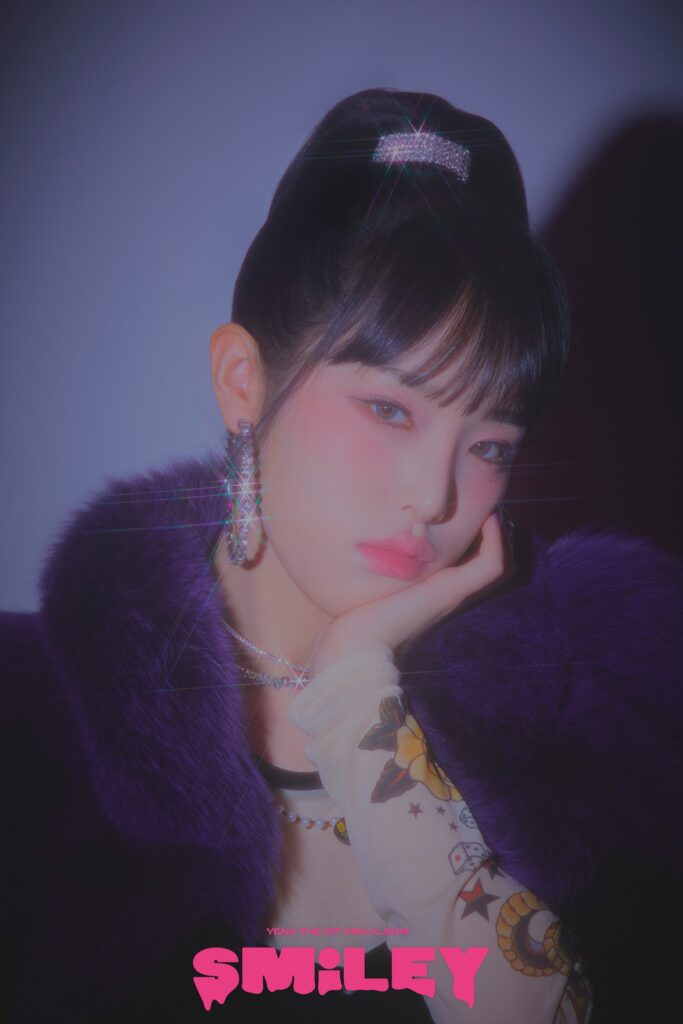
This commitment to a clear, unpretentious, and organic concept, and subsequent attention to detail, are what make Yena’s debut album one of the more sleek and focused of Iz One’s post-disbandment offering. Instead of opting for a hard-to-grasp sound or concept, losing the concept’s power through lacklustre execution, or simply trying to cover too much ground in the space of a short EP, Yuehua have chosen a single subject with care and spent any remaining time and energy on executing it with finesse.
As a result, the release feels refreshingly genuine – the album’s character and personality are carefully designed to be strikingly true to Yena’s own, and she performs it with both sincerity and self-awareness. Along with Yena’s proven prowess as a singer, rapper, and performer, this helps make Smiley pleasantly earnest.
Yena’s voice is particularly enjoyable for its husky tone, and she vocalises even high pitches and powerful notes comfortably; it adds a carbonated fizz to what could otherwise become cloyingly sweet songs. Lyrically, the project tells simple stories in first person about love, breakups, being happy, and having fun. It’s nothing ground-breaking, but feels authentic to her age and personality. Not trying to be anything she isn’t makes it easier to enjoy the music for what it is. Yena feels real and likeable, and that’s because these songs faithfully reflect those qualities in her like a mirror.
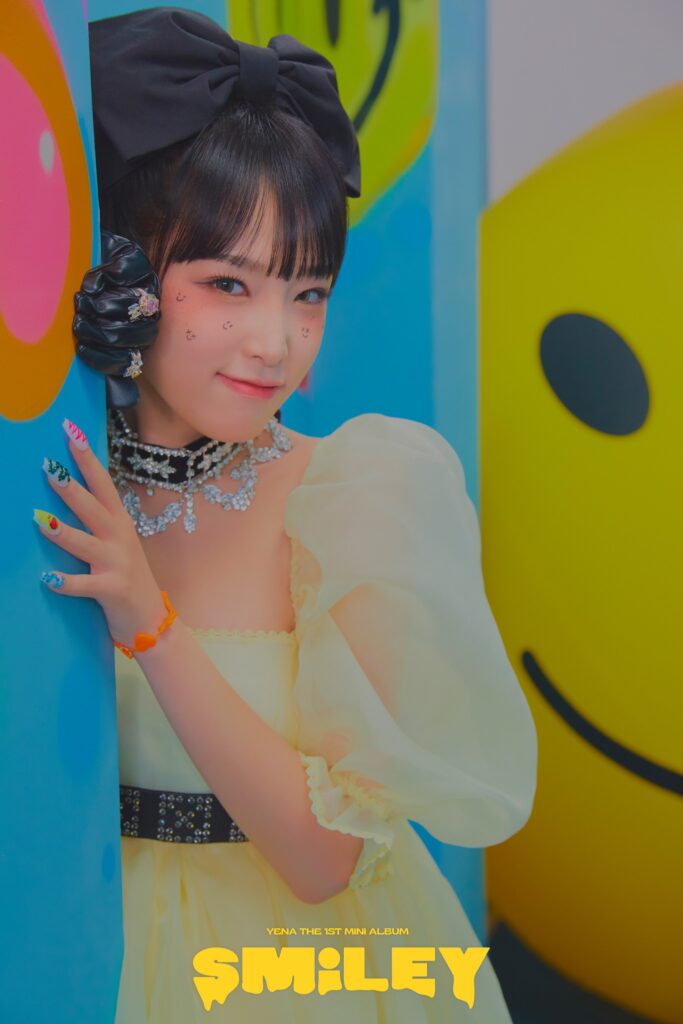
Moving forward, however, such a straightforward concept may prove difficult to extend further without recycling the same elements or feeling stagnant. To counter that, Yena and Yuehua would do well to make greater use of the rap skills and more mature style that she demonstrated as a member of Iz One in songs like “La Vie en Rose” and “D-D-Dance”. These qualities would extend her versatility considerably and allow room for organic growth, and if well utilised, could quickly secure her place as one of the few ex-Produce idols flourishing as soloists in the industry today.
